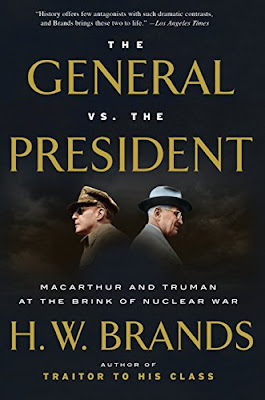"It's My Fault"
I read a really good exchange in H. W. Brands' book The General vs. The President, where
President Harry Truman is advised by one of his speech writers to add that his
decision to fire MacArthur was unanimously supported by all the Joint Chiefs of
Staff (his apolitical military council). MacArthur’s public comments and
military movements had verged very nearly to insubordination and required
something decisive to be done by the administration before things got worse.
But, because the President's approval rating was plummeting, and because firing
the ever popular MacArthur would incite quite a backlash, it would likely have
been prudent to make mention that the Joint Chiefs of Staff had unanimously
concurred with the decision to remove the general from command.
Yet, Truman refused to give mention of any of his advisers in
his initial statement. Brands records an exchange between Tannenwald and Truman
following the preparation of the public statement announcing MacArthur's
firing:
Just like in every other speech major speech, the president went through this line by line, and various comments and suggestions were made. And when he finished, also a part of the regular pattern, before he handed it to Joes Short, he turned to the assembled group and said, "Does anybody have anything to say?" And the rule of the house was that you could be the lowest man on the totem pole, and if you thought there was something that ought to be said, you could do it. And Truman was the kind of guy you could do this with. I said, "Yes, Mr. President, I think there's something missing. I think this statement ought to say that you're doing this on the unanimous advice of your principal civilian and military advisers."
Truman listened politely before rejecting Tannenwald's advice. "I will never forget this night as long as I live," Tannenwald related. "He turned to me with a twinkle in his eye and said, 'Not tonight, son. Tonight I am taking this decision on my own responsibility as president of the United States, and I want nobody to think that I am trying to share it with anybody else. This will come out in forty-eight hours or seventy-two hours, but as of tonight, this is my decision and my decision alone.'"
There is a great leadership principle here. Leaders take
full responsibility for their decisions; they alone shoulder the blame to even
those most controversial and upsetting. While it would be easier at times to
share the weight with others around you; to, in some controversies, even push
the blame on a scapegoat--the real leaders take it all on themselves. It is
what the office requires. And while it may lead to some immediate consequences
(a truly negative public reaction in Truman's case), it commands greater long
run respect among those following you.
I remember reading a quote in Doug Wilson's parenting book
entitled Future Men. He said that
when raising boys, it is imperative to ensure they take responsibility for
their actions. That they do not pass the buck, blame it on someone else,
complain about the situation, or mumble under their breath about the
unreasonableness of the parent. Boys must be able to say when confronted by
Dad, without any sarcasm: "yes, that is my fault," and proceed
immediately to correct the situation. Wilson reasoned further that
"leadership follows responsibility," and if we want our sons to
become leaders when their time comes, they need to make a habit of taking
responsibility for their actions in the present, even the actions of a group
when it was not exclusively their individual fault.
In a world of finger pointing and evasive hand raising, this
is phenomenal advice. We do not need to be the Presidents of the United States
to heed it either. Whether we are recognized as leaders or not, I think it is a
good rule of thumb to make an effort to take responsibility in whatever
capacity you find yourself. To say "my fault" when things don't go
according to plan, and work twice as hard to make it right. It is not only the
right thing to do, it may, in some instances, even lead to more responsibility
in the future.




Comments
Post a Comment